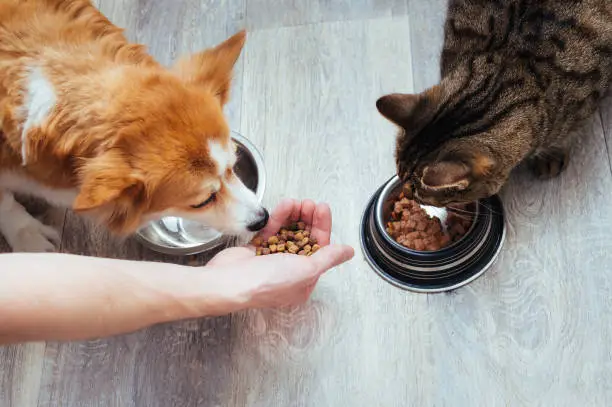Introduction
When it comes to pet care, understanding nutrition is crucial. While dogs and cats might share the same home, their dietary needs are quite different. This blog explores what aspects of nutrition can be shared between dogs and cats, and what each species requires uniquely for optimal health.
The Basics of Pet Nutrition
1. Essential Nutrients
Both dogs and cats need a balanced diet rich in essential nutrients to maintain health. These include:
- Proteins: Necessary for growth, tissue repair, and immune function.
- Fats: Provide energy and aid in the absorption of fat-soluble vitamins.
- Carbohydrates: Supply energy and support digestive health.
- Vitamins and Minerals: Crucial for metabolic functions and overall health.
2. Caloric Requirements
Dogs and cats have different caloric needs based on their size, age, activity level, and health status. It’s important to tailor their diets to meet these specific requirements.
Shared Nutritional Needs
1. Proteins
Both dogs and cats require protein, but their needs vary. Protein supports muscle growth and overall health. Dogs can utilize a variety of protein sources, including meat, poultry, and fish. Cats, being obligate carnivores, require higher protein levels and thrive on animal-based proteins.
2. Fats
Fats are essential for both dogs and cats. They provide energy, support skin and coat health, and are necessary for the absorption of certain vitamins. However, cats need more fats in their diet compared to dogs.
3. Water
Hydration is crucial for all pets. Both dogs and cats need access to fresh, clean water at all times to maintain proper hydration and overall health.
Unique Dietary Needs
1. Cats’ Specific Requirements
- Taurine: Unlike dogs, cats cannot synthesize taurine, an essential amino acid, and must obtain it from their diet. Taurine is vital for heart function, vision, and reproductive health.
- Vitamin A: Cats require preformed Vitamin A (found in animal tissues) because they cannot convert beta-carotene into Vitamin A like dogs can.
- Arginine: An essential amino acid for detoxification processes. Cats need it in their diet to prevent serious health issues.
2. Dogs’ Specific Requirements
- Carbohydrates: Dogs can utilize carbohydrates for energy and can digest a variety of sources, including grains and vegetables. Cats, on the other hand, have a minimal need for carbohydrates.
- Vitamin D: Dogs can convert sunlight into Vitamin D through their skin, unlike cats who need it in their diet.
Foods to Avoid
1. Toxic Foods for Both Pets
- Chocolate: Contains theobromine, which is toxic to both dogs and cats.
- Onions and Garlic: Can cause gastrointestinal upset and red blood cell damage.
- Grapes and Raisins: Can lead to kidney failure in dogs and cats.
2. Foods Safe for Dogs but Not for Cats
- Dairy: While dogs might tolerate dairy in small amounts, many cats are lactose intolerant and can suffer digestive issues if given milk or cheese.
3. Foods Safe for Cats but Not for Dogs
- Fish: Cats may benefit from occasional fish in their diet, but it should not be a staple. Excessive fish can lead to nutrient imbalances in dogs.
How to Manage a Multi-Pet Household
1. Separate Feeding Areas
To prevent conflicts and ensure each pet gets the appropriate food, establish separate feeding areas. This helps manage the unique dietary needs of dogs and cats.
2. Consult Your Vet
Regular consultations with a veterinarian can help tailor each pet’s diet to their specific needs. Vets can provide guidance on appropriate food types, portion sizes, and any necessary supplements.
3. Monitor Weight and Health
Regularly monitor your pets’ weight and health to ensure they are thriving on their diets. Adjustments may be necessary based on changes in activity levels, age, or health conditions.
Conclusion
Understanding the distinct nutritional needs of dogs and cats is key to keeping both pets healthy and happy. While there are areas where their diets can overlap, it’s important to respect their unique dietary requirements. By providing tailored nutrition and consulting with your vet, you can ensure both your canine and feline friends lead vibrant, healthy lives.











Leave a Reply